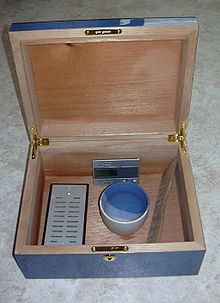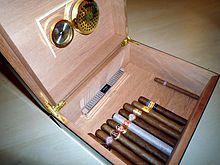Humidor

A humidor ( latin humidus , wet '), plurality Humidore , is of wood -made materials or other container in which cigars are stored. Humidors range in size from handy travel humidors to smaller boxes, chests of drawers and cupboards to large, walk-in humidors (air-conditioned rooms) in cigar shops. Humidors are equipped with a humidification system that should stabilize the relative humidity in the recommended range of 68 to 75%. If the humidity is too high, mold can easily form on the humidification system (sponge and distilled water) and on the cigars. If the humidity is too low, the cigars dry out, become brittle and acquire an unpleasant, pungent taste. A good humidor is primarily characterized by the fact that it can maintain constant ( tropical ) humidity inside. In this way, the cigars retain their full aroma and can be stored for years.
The boxes, which are not necessarily airtight, are mostly lined with West Indian cedar ( Cedrela odorata ) called "Spanish cedar" , which on the one hand supports the ripening and aroma development of a cigar and on the other hand repels pests such as mites and tobacco beetles . The wood of the Spanish cedar also helps to keep the humidity inside the humidor constant, as this wood can absorb moisture very well. The humidity is also ensured by humidification systems. They are based either on sponges or acrylic polymers and slowly release the absorbed moisture into the environment. A hygrometer is used to display the humidity . The humidity in humidors can also be adjusted with an electric humidifier that is controlled by a hygrostat .
Additions to the water should be avoided. A cigar is a natural product and would absorb all additives. It should be air-conditioned as in its country of origin. The belief persists that propylene glycol, when added to the humidifying water, optimally adjusts the vapor pressure in the evaporator due to its hygroscopic properties. This is not true, but propylene glycol is a good mold suppressant and will not change the aroma of the cigars. It also does not burn carcinogenic like z. B. benzoic acid .
In addition to extremely fine misting of ideally demineralized water, sufficient fresh air circulation is necessary in order to prevent rot in the first place. The air should circulate very slowly and in a balanced way, as a cigar wrapper is very sensitive to drafts and can therefore tear quickly. Especially with humidors with shelf inserts or different levels, the humidor should provide sufficient ventilation slots to ensure air circulation. An interior veneer made from Spanish cedar wood should be used in humidors. Thanks to its pronounced ability to absorb moisture, this ensures more constant climatic conditions and the special aroma provides protection against vermin. For this, however, the veneer thickness of the cedar wood must be sufficient, as is the case in high-quality brand humidors. The cedar wood should be installed raw, i.e. unpainted. Only in this way can it develop its positive effect. The essential oils of the wood can lead to sticking in some cases, especially if the wood does not dry sufficiently. This is also known as "resins".
There are now humidifiers on the market that use electronic sensors and controllers to achieve a high level of precision in humidity values. In addition, a target humidity can be preselected via the controller, which the humidor then automatically maintains. At the same time, these electronic humidifiers have a much higher humidification capacity, so that fluctuations in humidity can be compensated for much faster. This means that cigars can be stored unattended for years. It is recommended to leave the cigars in their boxes so that the different aromas do not mix in the humidor. This usually requires a larger humidor, as can be seen in the picture on the right.
Humidors must be prepared before use so that the interior wood can absorb moisture. This process takes a few days. If a humidor and its contents become too dry, the aroma of the cigars can be permanently damaged. A revival to the smokable state is possible within certain limits. It is important to note, however, that the re-moistening process must take place very slowly, otherwise the cigars will be permanently damaged.
Not all cigars need to be kept moist. Many Shortfiller just Tubos can be stored for weeks at about 20 ° C without interference. For Cuban or similar cigars (usually long fillers ), however, a humidor is a prerequisite. For temporary storage, you can build a humidor yourself with a few euros in materials that will keep the cigars fresh until they are consumed or stored in a “real” humidor.
